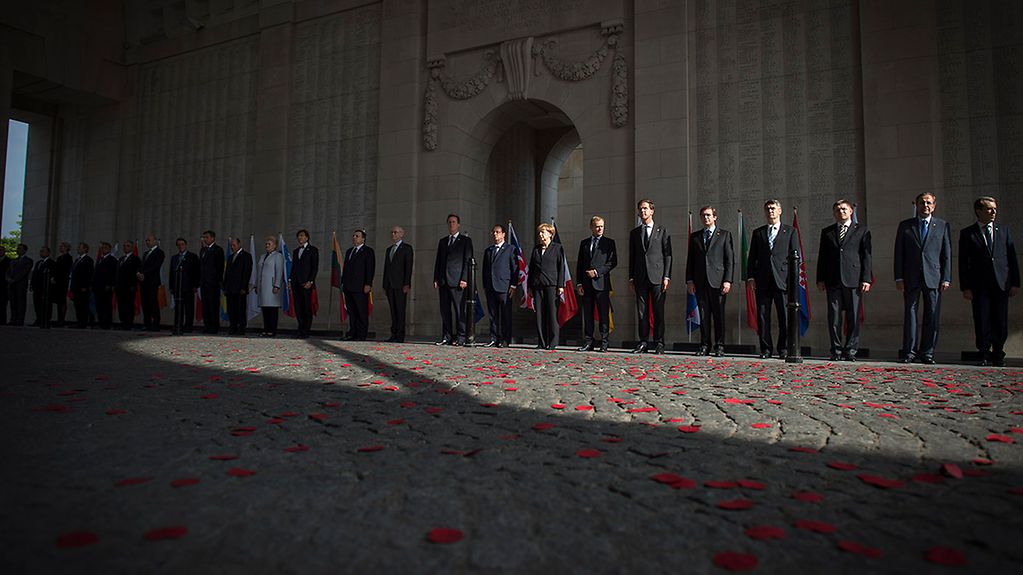European Council in Ypres
In the Belgian town of Ypres, one hundred years after the outbreak of the First World War, the heads of state and government of the EU states have honoured the memory of all those who lost their lives on the battlefields of Flanders. Afterwards they met for the first meeting of the European Council, which they then continued on Brussels.

At the Menin Gate Memorial in Ypres the heads of state and government remember those who lost their lives
Photo: Bundesregierung/Bergmann
President of the European Council Herman Van Rompuy had invited the heads of state and government of the European Union to Ypres. At a common memorial service they remembered the outbreak of the First World War, one hundred years earlier.
Learning from history
Chancellor Angela Merkel saw this joint ceremony as another indication of the European dimension of the events a century ago. Before the ceremony started she said in Kortrijk, "I believe that this once again shows us how lucky we are to live today – thanks to the European Union and thanks to the fact that we have learned from history."
She hoped that this "will also motivate (the responsible EU politicians) to make the necessary decisions for the coming five years".
The horror of mass war
Ypres is synonymous above all with the first use of poison gas – by German troops in April 1915. In the Second Battle of Ypres they attempted to break through the entrenched Allied lines on the Western Front with the help of chlorine gas. For Chancellor Angela Merkel the battles in Flanders symbolise the horrors of high-tech mass war. "Places like Ypres and Verdun symbolise the way the entire European continent tore itself apart," she said in a speech in the German Bundestag on 25 June.
Ypres was the site of embittered fighting during the First World War. Since late 1914 it had marked the Western Front. One of the bloodiest of five battles was the First Battle of Ypres, from 20 October to 18 November 1914, with heavy losses on both sides. Following the chlorine gas attacks in 1915, German troops also tested mustard gas for the first time near Ypres in 1917. Thousands of soldiers were either killed or very seriously injured.
During the First World War more than half a million lives were lost in the vicinity of Ypres alone. As well as Germans, British, French and Belgians, they included a large number of soldiers from the states that today make up the Commonwealth. Ypres is also a symbol of the resistance the Allies offered to the German attackers.
Commemoration ceremony at the Menin Gate
The ceremony of EU heads of state and government was held at the Menin Gate, which is the central memorial site in Ypres for those who fell in the First World War. Every day at eight o’clock in the evening the strains of "The Last Post" ring out there – as they have for 86 years. The simple tones of a solitary bugle honour the dead and the missing. Large numbers of the families of the fallen and other visitors still attend this daily ceremony.
The heads of state and government of EU member states inaugurated a peace bench in Menin Park. As part of the ceremony they planted symbolic china poppies in a flower bed – based on the poem by the Canadian, Lieutenant Colonel John McCrae "In Flanders Fields the poppies blow".
The Menin Gate, a monumental gate across a moat, was designed in classical style by Reginald Blomfield. The war memorial for soldiers from the United Kingdom and the Commonwealth bears 56,896 names of soldiers killed or missing. Today it is a living expression of the historical awareness of the city of Ypres, which was meticulously rebuilt, having been destroyed almost entirely during the war.
Protecting our united Europe
The ceremony was not only a call to remember the countless victims of the battlefields of Flanders. In her address during the budget debate in the German Bundestag, Chancellor Angela Merkel had also stressed how vital it is to protect the promise of a Europe united in joy and peace for the generations to come.
"That must be the vision that guides us in our work for our citizens: it is not the law of the jungle that will prevail in the long term, but the strength of what is right and lawful. That is our conviction," said the Chancellor, looking also to the crisis in Ukraine.
In view of events in Syria and Iraq too, the value of what has been achieved in Europe becomes apparent. To restore confidence in Europe, the European Council will focus on issues vital for the future at its next meeting in Brussels. This is to include a package of substantive matters and appointments, said Angela Merkel.